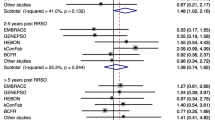Abstract
Purpose
Following a diagnosis of breast cancer, BRCA mutation carriers face an increased risk of developing a second (contralateral) cancer in the unaffected breast. It is important to identify predictors of contralateral cancer in order to make informed decisions about bilateral mastectomy. The impact of bilateral salpingo-oophorectomy (i.e., oophorectomy) on the risk of developing contralateral breast cancer is unclear. Thus, we conducted a prospective study of the relationship between oophorectomy and the risk of contralateral breast cancer in 1781 BRCA1 and 503 BRCA2 mutation carriers with breast cancer.
Methods
Women were followed from the date of diagnosis of their first breast cancer until the date of diagnosis of a contralateral breast cancer, bilateral mastectomy, date of death, or date of last follow-up. Cox proportional hazards regression was used to estimate the hazard ratio (HR) and 95% confidence interval (CI) of contralateral breast cancer associated with oophorectomy. Oophorectomy was included as a time-dependent covariate. We performed a left-censored analysis for those women who reported a primary breast cancer prior to study entry (i.e., from completion of baseline questionnaire).
Results
After an average of 9.8 years of follow-up, there were 179 (7.8%) contralateral breast cancers diagnosed. Oophorectomy was not associated with the risk of developing a second breast cancer (HR 0.92; 95% CI 0.68–1.25). The relationship did not vary by BRCA mutation type or by age at diagnosis of the first breast cancer. There was some evidence for a decreased risk of contralateral breast cancer among women with an ER-positive primary breast cancer, but this was based on a small number of events (n = 240).
Conclusion
Overall, our findings suggest that oophorectomy has little impact on the risk of contralateral breast cancer.
Similar content being viewed by others
References
Heemskerk-Gerritsen BA, Seynaeve C, van Asperen CJ et al (2015) Breast cancer risk after salpingo-oophorectomy in healthy BRCA1/2 mutation carriers: revisiting the evidence for risk reduction. J Natl Cancer Inst. https://doi.org/10.1093/jnci/djv033
Kotsopoulos J, Huzarski T, Gronwald J et al (2017) Bilateral oophorectomy and breast cancer risk in BRCA1 and BRCA2 mutation carriers. J Natl Cancer Inst. https://doi.org/10.1093/jnci/djv217
Domchek SM, Friebel TM, Singer CF et al (2010) Association of risk-reducing surgery in BRCA1 or BRCA2 mutation carriers with cancer risk and mortality. JAMA 304(9):967–975
Finch AP, Lubinski J, Moller P et al (2014) Impact of oophorectomy on cancer incidence and mortality in women with a BRCA1 or BRCA2 mutation. J Clin Oncol 32(15):1547–1553
Metcalfe K, Gershman S, Lynch HT et al (2011) Predictors of contralateral breast cancer in BRCA1 and BRCA2 mutation carriers. Br J Cancer 104(9):1384–1392
Mavaddat N, Peock S, Frost D et al (2013) Cancer risks for BRCA1 and BRCA2 mutation carriers: results from prospective analysis of EMBRACE. J Natl Cancer Inst 105(11):812–822
Mavaddat N, Barrowdale D, Andrulis IL et al (2012) Pathology of breast and ovarian cancers among BRCA1 and BRCA2 mutation carriers: results from the consortium of investigators of modifiers of BRCA1/2 (CIMBA). Cancer Epidemiol Biomark Prev 21(1):134–147
Basu NN, Ingham S, Hodson J et al (2015) Risk of contralateral breast cancer in BRCA1 and BRCA2 mutation carriers: a 30-year semi-prospective analysis. Fam Cancer 14(4):531–538
Weitzel JN, Robson M, Pasini B et al (2005) A comparison of bilateral breast cancers in BRCA carriers. Cancer Epidemiol Biomark Prev 14(6):1534–1538
Kuchenbaecker KB, Hopper JL, Barnes DR et al (2017) Risks of breast, ovarian, and contralateral breast cancer for BRCA1 and BRCA2 mutation carriers. JAMA 317(23):2402–2416
Narod SA, Tung N, Lubinski J et al (2014) A prior diagnosis of breast cancer is a risk factor for breast cancer in BRCA1 and BRCA2 carriers. Curr Oncol 21(2):64–68
Acknowledgements
We would like to acknowledge the study staff, students, and volunteers including Shana Kim, Farah Shoukat, Ellen MacDougall, Zoella Pasta, Nida Mian, Jennifer Ng, Sarah Chin, Hamida Begum, Harmeet Chaudhary, Asrafi Azmi, Shahana Nargis, Clotilde Ngwa, Mai Abdelhadi, Saiveena Penikalapati, Laavanya Somasundaram, and Hannah Horvath who helped with the data collection and data entry.
Other members of the Hereditary Breast Cancer Clinical Study Group: Tuya Pal, Georgia Wiesner, Charis Eng, Louise Bordeleau, Eitan Friedman, Wendy Meschino, Carrie Snyder, Kelly Metcalfe, Aletta Poll, Nicole Gojska, Ellen Warner, Barry Rosen, Jeanna McCuaig, Susan Armel, Rochelle Demsky, Karen Panabaker, Linda Steele, Howard Saal, Marie Wood, Wendy McKinnon, Edmond Lemire, Kim Serfas, Kevin Sweet, Seema Panchal, Christine Elser, Carey A. Cullinane, Robert E. Reilly, Joanne L. Blum, Ava Kwong, Cezary Cybulski, Tomasz Huzarski, Daniel Rayson, Claudine Isaacs, Teresa Ramón y Cajal, Jeffrey Dungan, Dana Zakalik, and Stephanie Cohen.
Funding
Joanne Kotsopoulos is a recipient of a Tier II Canada Research Chair. Steven A. Narod is the recipient of a Tier I Canada Research Chair. This study was supported by a Canadian Cancer Society Research Institute Grant (703058), the Peter Gilgan Foundation, and by a “Pink ribbon” grant (194751) from Den Norske Kreftforening to E.H.
Author information
Authors and Affiliations
Consortia
Corresponding author
Ethics declarations
Conflict of interest
All the authors declare that they have no conflict of interest.
Ethical approval
All procedures performed in studies involving human participants were in accordance with the ethical standards of the institutional and/or national research committee and with the 1964 Helsinki declaration and its later amendments or comparable ethical standards.
Informed consent
Informed consent was obtained from all individual participants included in the study.
Additional information
Publisher’s Note
Springer Nature remains neutral with regard to jurisdictional claims in published maps and institutional affiliations.
The other members of the Hereditary Breast Cancer Clinical Study Group are listed in the Acknowledgments.
Rights and permissions
About this article
Cite this article
Kotsopoulos, J., Lubinski, J., Lynch, H.T. et al. Oophorectomy and risk of contralateral breast cancer among BRCA1 and BRCA2 mutation carriers. Breast Cancer Res Treat 175, 443–449 (2019). https://doi.org/10.1007/s10549-019-05162-7
Received:
Accepted:
Published:
Issue Date:
DOI: https://doi.org/10.1007/s10549-019-05162-7




